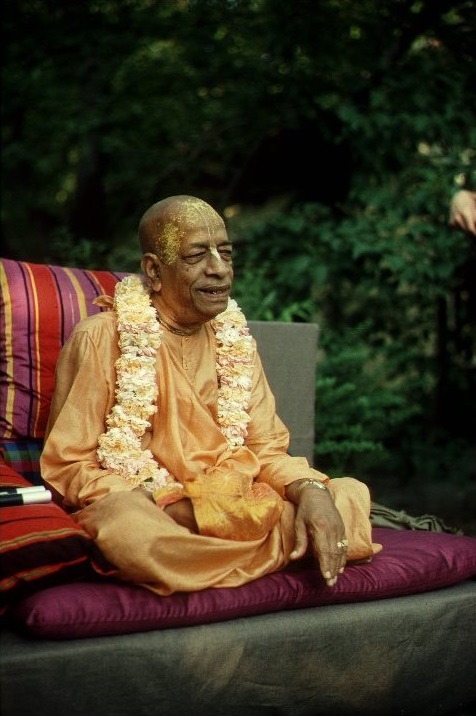Prabhupada: Any question?
Devotee: Are there any questions?
Indian lady: (Hindi)
Prabhupada: (Hindi) śiṣyas te 'haṁ śādhi māṁ prapannam (BG 2.7): "I have surrendered to You. You give me knowledge." That's all.
Indian man: When did you began to become the spiritual leader of Kṛṣṇa consciousness?
Prabhupada: What is that?
Devotee: He's asking when did you become the spiritual leader of Kṛṣṇa consciousness?
Prabhupada: When my Guru Mahārāja ordered me. This is the guru-paramparā.
Indian man: Did he just...
Prabhupada: Try to understand. Don't go very speedily. A guru can become guru when he's ordered by his guru. That's all. Otherwise nobody can become guru.
Indian lady: (Hindi)
Prabhupada: (Hindi) Śādhi māṁ prapannam. "I am surrendered to You. Whatever You say, I shall carry out." That's all.
Indian man: When did he tell you to...?
Prabhupada: What is the business, when did he tell me? And why shall I disclose to you? It is so very insignificant thing that I have to explain to you?
Indian man: No, I am just curious to know when.
Prabhupada: You should be curious within your limit. You should know that one can become guru when he is ordered by his guru. This much.
Devotee (2): Srila Prabhupada, if we think about our spiritual master, is that as good as thinking about Kṛṣṇa?
Prabhupada: Hmm?
Devotee: If we think about our spiritual master, is that as good as thinking of Kṛṣṇa?
Prabhupada: Yes, because it is said, yasya prasādād bhagavat-prasādaḥ: "If you can please your guru, then you please Kṛṣṇa." So if you make always this plan, "How to please my guru," then you'll please Kṛṣṇa. What is that?
Devotee (3): Srila Prabhupada, it is said in the Bhagavad-gītā that if one thinks in the time of death, if he thinks of Kṛṣṇa, he goes to Kṛṣṇa. What if one thinks of his spiritual master?
Prabhupada: He will go to Kṛṣṇa, because spiritual master is also going to Kṛṣṇa. (laughter) Now these questions should be on the subject matter which we have discussed. Don't bring outside question. Then there..., it will be no end. This is not the process. When we invite question—on the subject matter which we have spoken. Anyway, any other question?
Indian man (2): Swāmījī, the Lord Kṛṣṇa is showing viśva-svarūpa (universal form).
Prabhupada: Yes.
Indian man (2): So can you show me something about that viśva-svarūpa?
Prabhupada: You ask me? So am I Kṛṣṇa? (laughter) Why you are asking foolishly? That means you do not know Kṛṣṇa. You are thinking me as Kṛṣṇa. That you are foolish man.
Indian man (2): No, I am not calling you are Kṛṣṇa.
Prabhupada: Then why you are asking to show viśva-rūpa?
Indian man (2): Viśva-svarūpa, because Kṛṣṇa...
Prabhupada: Viśva-svarūpa will be shown by Kṛṣṇa, not by not-Kṛṣṇa. I am not Kṛṣṇa.
Indian man (2): No, I am not saying you are Kṛṣṇa. But you have said you are something about the...
Prabhupada: I am Kṛṣṇa's servant. What Kṛṣṇa says, I am carrying. That's all. That is my position. I am peon. When the peon delivers one thousand rupees or shillings to you, it is not his money. The money is paid by somebody, but I honestly deliver to you. That's all.
Indian man (2): But Kṛṣṇa has not given you power as guru?
Prabhupada: Yes, yes.
Indian man (2): So you can show?
Prabhupada: So I am not so powerful that I can show the viśva-rūpa. He has given me this power, that "You go and speak to the foolish rascals that I am Bhagavān," (laughter) that much power. Yes. That is my power. I can say to you that "Kṛṣṇa is Bhagavān." That's all. I never become equal to Kṛṣṇa.
Indian man (3): Srila Prabhupada, why do most people in this Kali-yuga worship Lord Śiva instead of worship Lord Kṛṣṇa? Because Kṛṣṇa known as God...
Prabhupada: Because they can get immediate money from Śiva. That is the reason. Lord Śiva is the proprietor, or the supreme person within this material world, and he is āśutoṣa, very easily pleased. Therefore materialistic person go to him for some material benefit, and he gives. That's all.
Indian man (4): But Lord Śiva is the greatest Vaiṣṇava.
Prabhupada: Yes, everyone is Vaiṣṇava. He is the greatest Vaiṣṇava. Vaiṣṇavānāṁ yathā śambhuḥ. Unless he is Vaiṣṇava, how he gets this power? The power comes from the original person. Mattaḥ smṛtir jñānam apohanaṁ ca (BG 15.15). So unless one is Vaiṣṇava, he has no power. All right.
Indian man: Srila Prabhupada...
Prabhupada: You have questioned once, not twice.
Devotee (2): Srila Prabhupada...
Prabhupada: You have already done question.
Indian man (3): Srila Prabhupada...
Prabhupada: You have also done. Don't take all the time. Let others say. (break)
Indian man (5): Prabhupada, when we do our chanting, the chanting beads contain 108 beads. Why is this, and why do we chant sixteen rounds?
Prabhupada: Not sixteen rounds. You can chant unlimitedly.
Indian man (5): No, minimum.
Prabhupada: Minimum means because they cannot chant more than that, therefore minimum. Otherwise, kīrtanīyaḥ sadā hariḥ (CC Adi 17.31). So you must have a fixed amount of kīrtana. That is called tapasya, that "We must finish at least this much, if not more." Saṅkhyā-pūrvaka-nāma-gāna-natibhiḥ (Ṣaḍ-gosvāmy-aṣṭaka 6). Saṅkhyā-pūrvaka. By numerical strength one should chant. That is called vow. This is the idea. So these Europeans, Americans, they cannot imitate Haridāsa Ṭhākura, who was chanting 300,000 times. So we do not advise to imitate. Really do something. One name is sufficient. If you can chant one name only, that is sufficient. But that is not possible. So to understand the value of name, at least we must have some numerical strength. All the Gosvāmīs used to do that. We follow their footprints.
Thank you. Now chant Hare Kṛṣṇa.
(Srila Prabhupada Lecture, Nairobi, October 28, 1975)
.

